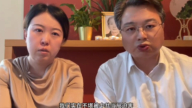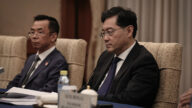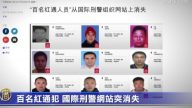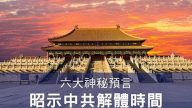【新唐人2013年01月17日訊】去年,大陸媒體曾報導了多地政府機構人員,放盤出售房產和攜款外逃的信息。最近又有消息披露,中共中紀委已經掌握了部分官員拋售豪宅,和提取外幣準備外逃的內幕和數據,中紀委還向這些官員發出了停止操作的「內部通報」。評論分析,中共體制是腐敗的根源,中紀委只是用一個「通報」,恐怕難以遏制貪官外逃,更不可能杜絕中共官場的腐敗。
中共「十八大」後,北京、上海、廣州等地二手房成交量明顯增長。大陸《華商報》報導,調查發現,多地出現政府機構人員放盤出售房屋的現象,因此引發了二手房產市場的爆棚。
據了解,確實有公務員坦言,由於擔憂自己非正常途徑獲得的房產會被調查,加上市場不景氣,資金偏緊,他們希望抵押手中的包括土地和房產等資源,儘快獲得貸款,考慮把資產轉移到海外。
大陸官員拋售「灰色房產」和轉移資產的浪潮,一度在海內外掀起討論,自然也引起中共高層的警惕。香港《爭鳴》雜誌發表文章透露,中共中紀委掌握了部分官員所在城市的拋售概況,和銀行提取外幣轉移的情況,並且在內部做了通報。
通報的數據顯示:到去年12月11號,涉嫌黨政、國家機關、部門高中級公職人員,在市場放售豪華住宅17萬7530多幢;各類別別墅3470多座。這些豪宅分佈在天津、瀋陽、濟南、南京、上海、廣州等45個大中城市裡面。
通報指出,拋售的住宅業主有60%是持匿名、假名或以公司掛名;而這些物業大多數空置或出租給親屬、朋友,沒有租住合約;另外,物業出售都要求現金交易,不經金融機構;並且都委託律師全權處理,業主在交易過程中不露面。
文章說,中紀委針對120名中共官員發出了停止交易的通報,並且把這一事態作為「反腐敗鬥爭工作的新動向」。
美國「南卡羅萊納大學」教授謝田表示,中紀委只是發出了一個通報,警告這些官員停止拋售轉移土地和房產,這種做法治標不治本,反腐難以奏效。
美國「南卡羅萊納大學」教授 謝田:「實際上中紀委應該追究的,首先,這些貪官是不是有資格或有權力,正當的擁有這些豪宅。首先它應該追究的是把這些貪污的官員非法擁有的豪宅沒收回來,不光是正準備拋售的這些官員,而是所有的官員在內非法擁有的,或者貪污得到的,或利用自己的權力收賄,受賄,行賄,收回得到的房地產,全部都查出來,才能從根本上解決問題。」
大陸民主人士恩廣指出,這是中共的一貫表現,它肯定要查一部分,先把官員的資料掌握在手裡,不一定真的會去處理查出來的問題。因為,恩廣說,中共製衡的標準是,「聽不聽黨的話」。
大陸民主人士 恩廣:「他們查處這一塊,包括海外資金、只是像徵性的一種行為,讓官員老老實實做官,不能對體制,不能對黨有任何謹小慎微的這種做法,如果一旦走的不好的話,那把這些信息公布的話,直接安一個名,貪污腐敗,然後直接就法辦你了。」
謝田指出,中共現在是無官不貪,中紀委這樣做是想起到一種威脅的作用。不過,謝田指出,當這些官員感到有威脅的時候,如果不用拋售豪宅的辦法,也會想出別的辦法,儘快處理資產,把資金帶到國外去—-選擇「外逃」。
中紀委的通報中說,「十八大」後又有大批貪官准備外逃。據「中國人民銀行」和「銀監會」的統計,去年12月上旬被提取92.46億美元等值外幣,11月被提取146.44億美元等值外幣。
謝田認為,這種現象只會加速中共房地產泡沫的破滅,也會加速中共體系的解體。
採訪編輯/唐睿 後製/王明宇
Central Commission for Discipline Inspection Internal Bulletin Exposes Astonishing Corruption
Last year, reports of corrupt officials selling their real estate
and fleeing overseas were published by Mainland media.
Recently, it was said that the Communist Central Commission
for Discipline Inspection (CCDI) has controlled information
of some officials who intended to sell their properties
and flee with foreign currencies.
The CCDI has issued an internal bulletin to ask them
to stop their activities.
It is commented that the Communism is the root
of the corruption.
A bulletin from CCDI will neither stop the escape
of the corrupt officials nor terminate the corruption in the Communist regime.
After the 18th National Congress, there has been a prominent
growth of housing turnover in Beijing, Shanghai, and Guangzhou.
The Chinese Business View reported that housing turnover
skyrocketed because many local officials were selling their houses.
There were officials admitting frankly their concern
over the investigation of their properties.
The market downturn has also pushed them to mortgage
the properties and transfer assets overseas.
The wave of officials selling gray listing properties
has drawn attention both at home and abroad.
Hong Kong’s Cheng Ming Magazine reported that the CCDI
has obtained information of some officials who sold houses
as well as withdrew foreign currencies
and issued an internal bulletin.
According to the bulletin, up to December 11 of 2012,
more than 177,530 luxurious houses and 3,470 villas were put on the market by alleged officials.
These properties distributed in 45 large and medium-sized
cities such as Tianjin, Shenyang, Jinan, Nanjing, Shanghai, Guangzhou and so forth.
The bulletin pointed out that 60% of these owners sold their
properties in anonymity, under pseudonyms or used businesses;
Most of these properties are either vacant or rented
to relatives and friends without a rental contract;
Properties were sold with cash only and
without a financial agency;
Transactions were done through lawyers,
and the owners remained behind the scene.
The Magazine stated that CCDI issued bulletin targeting
120 officials and considered this move,"a new trend in the anti-corruption struggle."
Professor Xie Tian of University of South Carolina indicates
that the purpose of the CCDI bulletin is to warn the officials and ask them to stop their transaction.
But it will not be effective in fighting corruption.
University of South Carolina Professor Xie Tian: “In fact,
the CCDI should investigate, first of all, if these corrupt officials are entitled to these properties.
The CCDI should confiscate all illegal properties,
not just the ones belonging to those who are ready to sell them.
All officials whose properties were obtained illegally
or via bribery should be investigated.
Confiscate all those identified.
That will solve the problem fundamentally."
The Chinese activist En Guang points out that this
is a consistent behavior of the Chinese Communist Party.
It will certainly conduct an investigation
to control information.
But nothing substantial will be done after the investigation.
En Guan says,"the standard of check and balance
of the Communist is ‘obeying the party’."
Activist En Guang: “Their investigation, including
the overseas assets, is only a symbolic act to control the officials for as long as they are obedient to the party.
If any misconduct to the party is identified,
the official will be charged with corruption based on the information investigated."
Xie Tian points out that all officials in the
Communist regime are corrupt.
The CCDI’s tactic was to threaten those officials.
However, when threatened, those officials will find
their ways to cash out their properties and escape overseas.
CCDI bulletin stated that a large number of corrupt officials
are to flee after the 18th National Congress.
According to the statistics of the People’s Bank of China
and China Banking Regulatory Commission,
a total of foreign currency equivalent to US $ 9.246 billion
was extracted early December last year, and US $14.644 billion was extracted in November.
Xie Tian believes this phenomenon will only accelerate
the bursting of the real estate bubble in China, and the disintegration of the Chinese Communist regime.



























